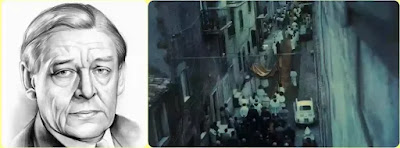Also Read
Preludes
I
The winter evening settles down
With smell of steaks in passageways.
Six o'clock.
The burnt-out ends of smoky days.
And now a gusty shower wraps
The grimy scraps
Of withered leaves about your feet
And newspapers from vacant lots;
The showers beat
On broken blinds and chimney pots,
And at the corner of the street
A lonely cab-horse steams and stamps.
And then the lighting of the lamps.
II
The morning comes to consciousness
Of faint stale smells of beer
From the sawdust-trampled street
With all its muddy feet that press
To early coffee-stands.
With the other masquerades
That times resumes,
One thinks of all the hands
That are raising dingy shades
In a thousand furnished rooms.
III
You tossed a blanket from the bed
You lay upon your back, and waited;
You dozed, and watched the night revealing
The thousand sordid images
Of which your soul was constituted;
They flickered against the ceiling.
And when all the world came back
And the light crept up between the shutters
And you heard the sparrows in the gutters,
You had such a vision of the street
As the street hardly understands;
Sitting along the bed's edge, where
You curled the papers from your hair,
Or clasped the yellow soles of feet
In the palms of both soiled hands.
IV
His soul stretched tight across the skies
That fade behind a city block,
Or trampled by insistent feet
At four and five and six o'clock;
And short square fingers stuffing pipes,
And evening newspapers, and eyes
Assured of certain certainties,
The conscience of a blackened street
Impatient to assume the world.
I am moved by fancies that are curled
Around these images, and cling:
The notion of some infinitely gentle
Infinitely suffering thing.
Wipe your hand across your mouth, and laugh;
The worlds revolve like ancient women
Gathering fuel in vacant lots.
Summary and Analysis
Introduction: Preludes, written in 1915 and included in the collection Prufrock in 1917, are preludes to various parts of the diurnal round. Emotional selection heightens what is seen. One should carefully note the qualifying words, for they intensify the significance of what is seen. The image reflects the mind.
Summary: The poem Preludes is made up of a sequence of descriptions of details of urban experience. The first prelude describes a dirty, wet winter evening with the smell of stale food in the passageways. The second prelude deals with a dingy, monotonous morning smelling of stale beer. In the third prelude, the "thousand sordid images" are seen in a dozing half dream of the early morning. In the fourth prelude we have evening again, once more dull and monotonous. The watcher takes it all in - "His soul stretched tight across the skies". Then the speaker becomes 'I' as he becomes conscious of some "infinitely gentle... suffering things". In the last three lines, the speaker seems to revert to the earlier mood of disgust and scorn at the sordidness. However, there is also a shade of pity, for the sight of an old woman gathering fuel from a vacant lot would arouse pity rather than laughter.
Critical Appreciation: The Preludes depict the same aspects of the urban experience as he come across in Prufrock. The first two Preludes are objective presentations of the city in the evening and morning, in the style of the Imagist. Eliot apparently thought that objects of perception, in spite of efforts at being objective, cannot be wholly separated from the mind that perceives. Note the line: "The morning comes to consciousness." In the third and fourth preludes, Eliot makes clear the mind's yearning for significance beyond the random details of consciousness. There is the wistful longing for a vision of the street: "As the street hardly understand". Hence the speaker feels the "notion of some infinitely gentle.. suffering things". Preludes contains some striking pictures of the dreariness and anonymity of the urban scene.
